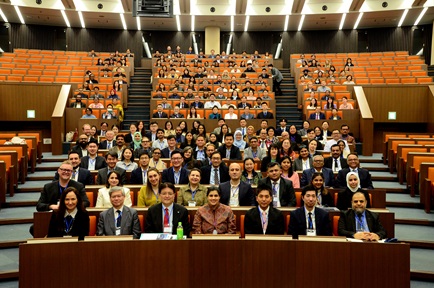Overseas stints, room to progress help some young accountants in Singapore stay the course
While younger talent in the accounting industry has decreased due to relatively lower starting salaries and long working hours, those who have stayed the course say the profession can be rewarding, with good opportunities for upskilling and for pay to grow.
As for the common bugbear of long and unpredictable hours, audit professional Audrey Tong reckons the workload can be intense, but this applies only during peak periods.
"I find that I have time to pursue my hobbies, like dancing, yoga, para-gliding and surfing," she said, adding that she tries to dedicate about 30 per cent of her time in a year to her sports and social pursuits.
Ms Tong, 34, has been in the audit profession for 12 years since graduating from the National University of Singapore with a degree in business administration (accounting). She is currently a general assurance director at PwC Singapore.
According to the Institute of Singapore Chartered Accountants (Isca), its number of young members decreased by about 42 per cent between 2020 and 2023.
Isca, the national accountancy body of Singapore with over 36,000 members, defines young accountants as those aged 35 and below.
Singapore's accountancy sector is estimated to be 120,000-strong.
But accountancy cohort sizes in Singapore's autonomous universities have dropped by more than 10 per cent since 2018, according to data from the Singapore Yearbook Of Manpower Statistics 2024.
A report released in May by the Accountancy Workforce Review Committee (AWRC), which was set up to address manpower challenges faced by the accountancy sector, said lower starting salaries and long and unpredictable working hours are some of the reasons for the dip in younger accountants.
"It is not unusual for accountants to have to work extended hours during peak periods to meet client expectations and comply with the seasonal regulatory deadlines for financial reporting obligations, while ensuring a high quality of work throughout," the report said.
But the industry has its attractions - enriching career experiences were one of the pull factors that motivated Ms Tong to remain in the industry.
She had the opportunity to go for a secondment to PwC's London office for three years, where she got to manage projects which pushed her to step out of her comfort zone, making her more adaptable.
Senior financial accountant Emersius Lau, 31, who works at a multinational entertainment company, says opportunities for progression and salary growth are high, given the diverse career pathways available in accountancy and finance.
"There's a high demand for these accounting and finance skills which are essential to every organisation," he added.
But he recalls facing some difficulties when he first entered the industry, especially during peak seasons with multiple client portfolios and tight deadlines.
Nonetheless, Mr Lau, who has been in the industry for seven years after graduating from Nanyang Business School with a Bachelor of Accountancy, says the profession can also be dynamic and exciting.
"I've done many activities throughout my career, from putting on a hard hat and counting hundreds of water barriers under the hot sun at construction sites, to something more routine like preparation and analysis of financial reports of companies," he said.
Ms Tong says that as part of Isca's Young Professionals Advisory Committee, she had organised an event to give back to the community.
"We brought children from less privileged backgrounds to Gardens by the Bay and played games with them while sharing about accounting to them in a more interesting way," she said, adding that such experiences made her feel that her job is a meaningful one.
In the AWRC report, better starting pay was one of the recommendations it made to draw more talent to the sector.
Accountancy graduates from Singapore's autonomous universities earned a median gross monthly starting salary of $3,800, which was lower than that of their peers from these universities ($4,313), according to the 2023 Graduate Employment Survey. Those who were in accounting jobs earned even less - $3,600.
Some accounting firms in Singapore have committed to raising salaries in a bid to attract more talent to the sector.
In May, Deloitte announced that it will increase its starting pay by up to 20 per cent for graduates joining as first-year audit associates, starting from September.
KPMG had also announced upcoming pay rises in the year for some employees.
Ms Tong says: "I think my salary is competitive - it has allowed me to provide for my family, give back to my community and also purchase my first property at the age of 30."
The AWRC report also noted that there has been a declining interest in the profession among job seekers, with fewer students interested in studying accountancy, while people who do not have a background in the field find it difficult to enter the profession.
This is compounded by a growing number of attractive alternative career options in the technology and financial services sectors, where accountancy graduates would have the aptitude and skills to thrive, said the report.
"Younger accountants now may also be less willing to accept the short-term trade-offs of lower starting salaries, to enjoy the long-term rewards of a career in accounting," it added.
"These issues affect the value proposition of the accountancy profession. Graduates may be willing to work long hours with a higher starting salary, but not work long hours with a lower starting salary, especially if they have attractive alternatives."
The report warned of a manpower shortage in the future if the industry fails to address falling intakes of accountancy students as well as graduates who do not enter the profession, even as demand remains high as Singapore grows as a business hub.
Among people employed in the accountancy sector here, close to 20 per cent are employed in accounting firms, which contribute $2.95 billion to Singapore's annual gross domestic product, said the AWRC report, citing a 2022 survey.
The remaining 80 per cent are in accounting and finance functions in businesses, it added.
Mr Lau said some of his peers who have left the industry are in project management or financial consulting roles in insurance firms.
"A large percentage are in non-accounting related roles but still within finance, such as financial planning and analysis, tax or business partnering," he added.
The AWRC report said of the crucial role of accountants: "With their financial expertise and commitment to upholding ethics, accountants are our first line of defence against any possible risks of fraud or financial misrepresentation. With global trends such as sustainability and artificial intelligence, the stewardship role of accountants will also expand to issues such as sustainability disclosures and IT assurance."
Ms Tong says: "Accounting is a rewarding job to me, because tracking the flow of money helps businesses understand their financial health better."
Accounting helps businesses uncover gaps and improve their controls, which ends up benefiting the economy too, she added.
Source: The Straits Times







